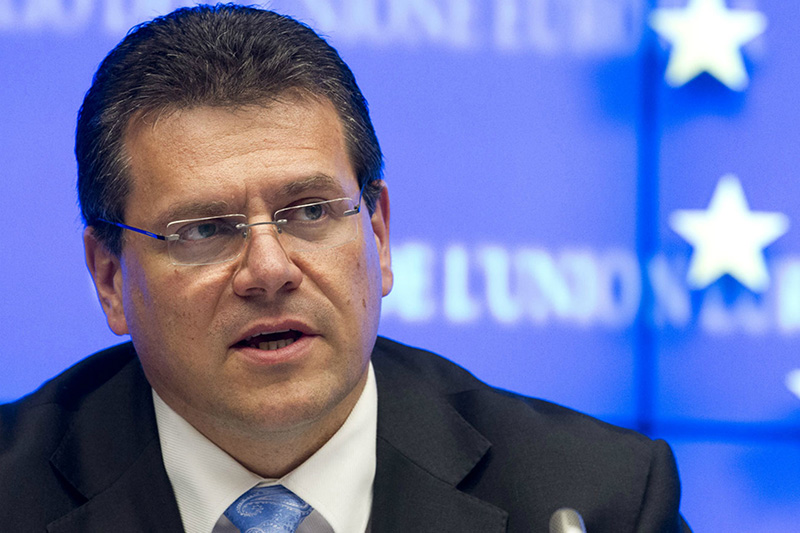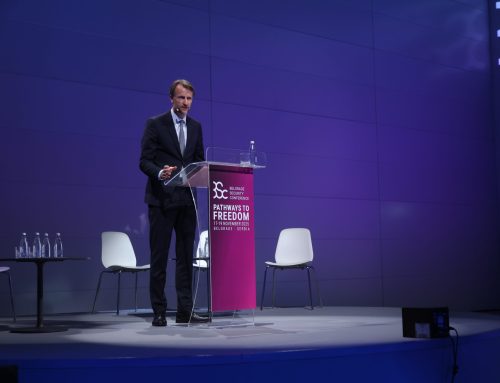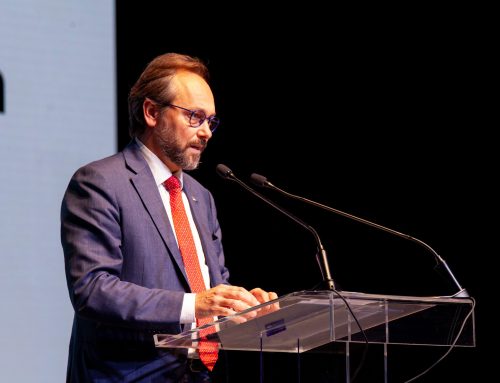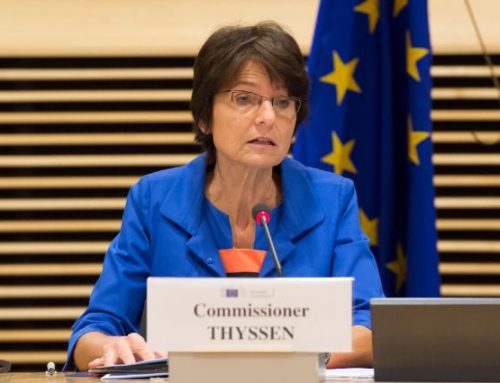[CHECK AGAINST DELIVERY]
Prime Minister Vučić,
Ministers,
Your Excellency Ms Moro,
Ladies and Gentlemen,
It’s a great pleasure to be with you today here in the Serbian capital, Belgrade, a European capital. We are here together today to talk about climate change, which you may associate with the environment, with our sea-level, with our air quality; all of which are true. But the threats and implications of climate-change go far beyond these challenges;
- Compromising our public health due to phenomena like pollution and heat waves;
- endangering our food and water resources, and slowing down economic growth;
- driving entire populations into migration and often into conflict;
- significantly increasing the severity and frequency of natural disasters.
I am sure there isn’t a single person in this room who doesn’t remember last year’s devastating floods here in the Balkans, which cost the lives of 60 people and displaced thousands. I remember them very vividly. I can also assure you that if such a catastrophe happened again, the EU will be here to provide assistance just as we did last time. But our responsibility, as decision-makers, is not only to react to such crises, but also to try to prevent them from recurring. Natural disasters are not as unpredictable as some may think; they have a strong direct link to global warming, as it has been repeatedly proven by science.
That is what why it was so important to me to come and participate in this High-Level Conference on Climate change. The facts on the climate challenge are clear:
- 2014 was the hottest year on record and 14 of the 15 warmest years on record have occurred this century.
- The impacts are already visible, and the risks increase as the globe continues to warm.
The EU is engaged in proactive climate diplomacy, reaching out to governments around the world, and making sure they are part of the change. Climate change affects us all. That’s why we must all be part of this change. How?
Precisely six months from now, we will be in the final days of the Paris climate conference where the international community will seek a new global agreement to fight climate change. Today, I would like to highlight three topics that I believe are of particular interest to you, here in Serbia, in the run-up to Paris and beyond:
- First, why it is so important that Serbia is involved and actively contributes to the climate negotiations.
- Second, how taking action for the climate can help your economy and society more resilient for the future.
- And finally, how the EU and the European Commission in particular can support Serbia in your accession endeavours, including the climate and energy aspects.
Let me start with the international climate talks that are gathering pace as we get closer to the United Nations climate conference in Paris this December. Our ambition is to reach an ambitious, legally binding global climate agreement that will keep us on track to limit global warming to 2 Celsius degrees, compared to pre-industrial times. An ambition that just some days ago was strongly supported at the G7 Summit.
All countries have a part to play. In the run-up to Paris, which is now, governments are expected to come forward with their plans on how they will contribute to the new agreement – their intended nationally determined contributions, or INDCs.
This is no small task.
The current climate regime requires emissions reductions from only a limited number of countries. In the new agreement, ALL countries will have to do their share, according to their capabilities of course. In this context, the European Union has committed itself to a target of cutting greenhouse gas emissions by at least 40% by 2030.
What does that mean in concrete terms, you may ask. It means that in 2030 the EU will emit 2.2 gigatonnes less greenhouse gases than in 1990. That’s equivalent to all the emissions today of our three largest Member States – Germany, the UK and France. This is an ambitious target. But with the determined efforts of our Member States, we are confident it can be achieved. The EU, however, accounts for less than 10% of global emissions today. That is why we need all other countries and regions on board as well.
As of yesterday, ten other countries have submitted their contributions. These together with the EU represent some [28%] of global emissions. Ethiopia and Morocco just submitted theirs last night and we expect more countries to follow during June and July. I am very pleased to hear the Serbian Government’s announcement on your intended contribution. This is a great achievement that shows your commitment to the international efforts and the EU integration process.
As the first EU Candidate Country to do this, you are setting an example for others to follow. This is important, because by Paris, we need to have a clear view on where we currently stand and what remains to be done to keep us on track towards our long-term goal. We need this to be able to design a robust agreement that is fit for the future. Achieving this will undoubtedly be a challenge. At the same time, it will be a unique opportunity to kick-start a transformation towards a more sustainable, low-carbon global economy.
This brings me to my second point – the multiple benefits of climate action.
Indeed, Serbia’s contribution to the global agreement is important not only in the context of the international process but – perhaps even more importantly – for you, here in Serbia.
Some people are concerned that climate policies come at the expense of the economy. Or say that addressing climate issues is a luxury that can wait until we have solved other problems.
Ladies and gentlemen, there is absolutely no tension between fighting climate change and stimulating jobs and growth. On the contrary: the EU’s experience shows that emissions reductions and economic growth are compatible. Since 1990, we have cut our emissions by 19% while our GDP has risen by 45%. The green economy is proving to be one of the most promising areas for job creation in the EU, even seeing a 20% increase during the recession years[1]. The EU’s renewable sector alone, has a combined annual turnover of €129bn and employ over a million people. Eco-industries and eco-innovation currently supply a third of the global market for green technologies, worth a trillion euro and expected to double by 2020.
Climate action also goes hand in hand with addressing the pressing energy challengesboth the EU countries and Serbia are facing today.
By saving energy and getting more of our energy from renewable sources, we can not only cut emissions but also reduce our dependency on external suppliers and cut our huge fuel import costs. That’s why building a strong Energy Union with a forward-looking climate policy is a top priority for the European Commission. As I am sure you know, the Energy Union is outward looking and does not stop at the EU borders, Serbia will have an important role to play in it!
Energy efficiency is also a booming sector which creates millions of jobs. Either Europe follows other economic powers or it leads this transition itself. These jobs can be created in California’s Silicon Valley or Bangalore. But it can also happen in Dublin, Berlin, and here in Serbia!
Our vision is to build an energy market that is economically sustainable, socially inclusive, and environmentally friendly – and we are working towards this vision with concrete initiatives and legislation.
One element is the targets we have set at EU level for 2030. In addition to cutting our emissions by at least 40%, we will boost our energy efficiency by at least 27% and increase the share of renewables to at least 27% of our energy use.
In Serbia, too, there is significant potential in these areas – for example in exploiting the renewable energy resources of your country and tapping into the energy saving potential in the industrial and building sectors.
In this context, let me also stress the importance of implementation. Because at the end of the day, what really matters is how we turn our plans into concrete action on the ground. This is essential for reaping the economic benefits of the low-carbon transition – creating new jobs and market opportunities, providing regulatory certainty for investors, and increasing the security of energy supplies.
It also benefits the everyday lives of our citizens by improving air quality and making our societies less vulnerable to extreme climate-related events.
Moving on to my third topic, your EU accession process. Let me first stress EU’s commitment to this process in general and to Serbia in particular. Serbia is a key country in the region, and your accession process is an important driver for positive change. During this process, you can count on the strong support of the European Commission. This also applies to the future opening of negotiations in the policy fields of climate and energy. These negotiations will no doubt bring significant challenges. Your commitment and resources will be essential. The Serbian Government needs to plan well ahead, with the support of EU financial instruments and our technical assistance.
I am aware how laborious this process is, as Slovakia – my home country – went through it before joining the EU. But it is also a highly transformative process that supports economic restructuring – it helps stabilise the business environment, liberalise trade, and improve financial services, to name a few. And while there is a lot of work to be done in these areas, I’d like to commend the Serbian Government which has presented a very ambitious reform agenda and is very committed to implementing it. Ultimately, the Serbian commitment to press on with the reforms and allocate sufficient human and financial resources to the negotiation process will determine how successful Serbia will be on its path to EU membership.
The EU will continue supporting Serbia – on climate and energy as well as on other fields. Your success today in adopting Serbia’s INDC is an exemplary step on this path. I would like to conclude with an invitation; an invitation to Serbia and its decision makers to join us in this journey by making bold, ambitious contributions. I am convinced that the energy transition could be the Marshall Plan of the 21st century, and I would like Serbia to be a part of it!
Thank you very much.




